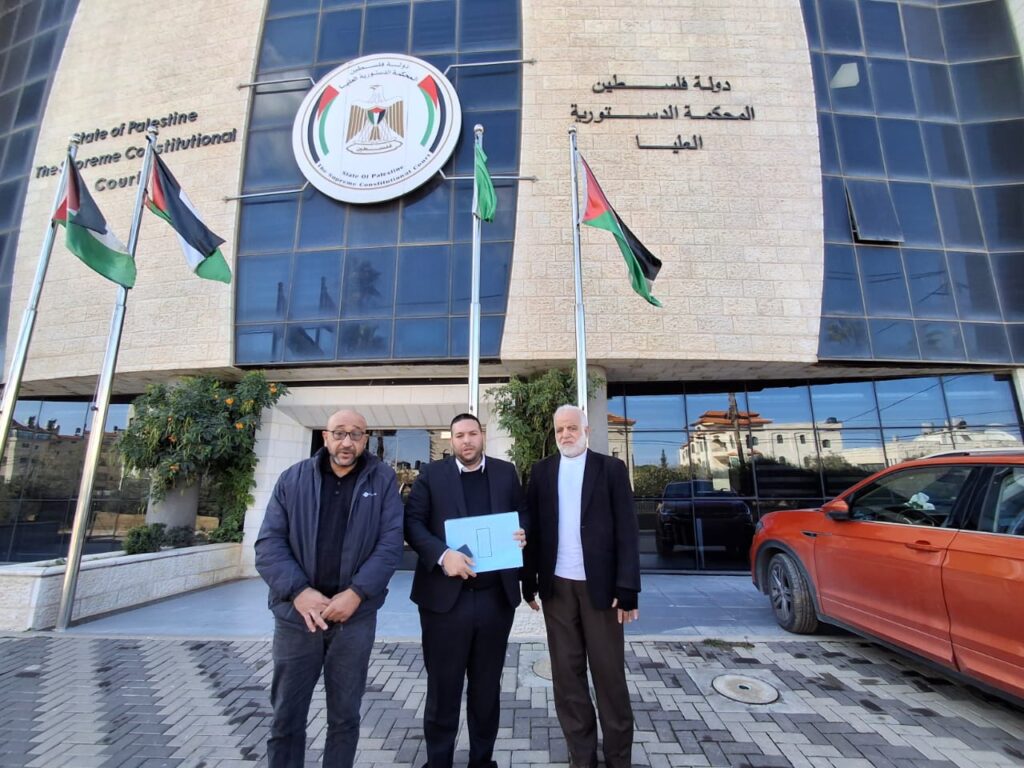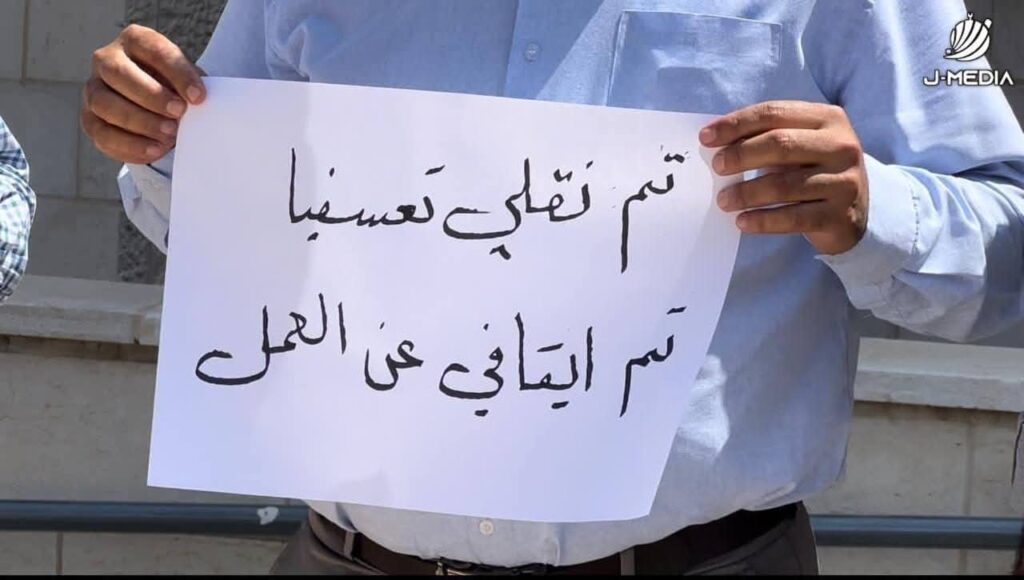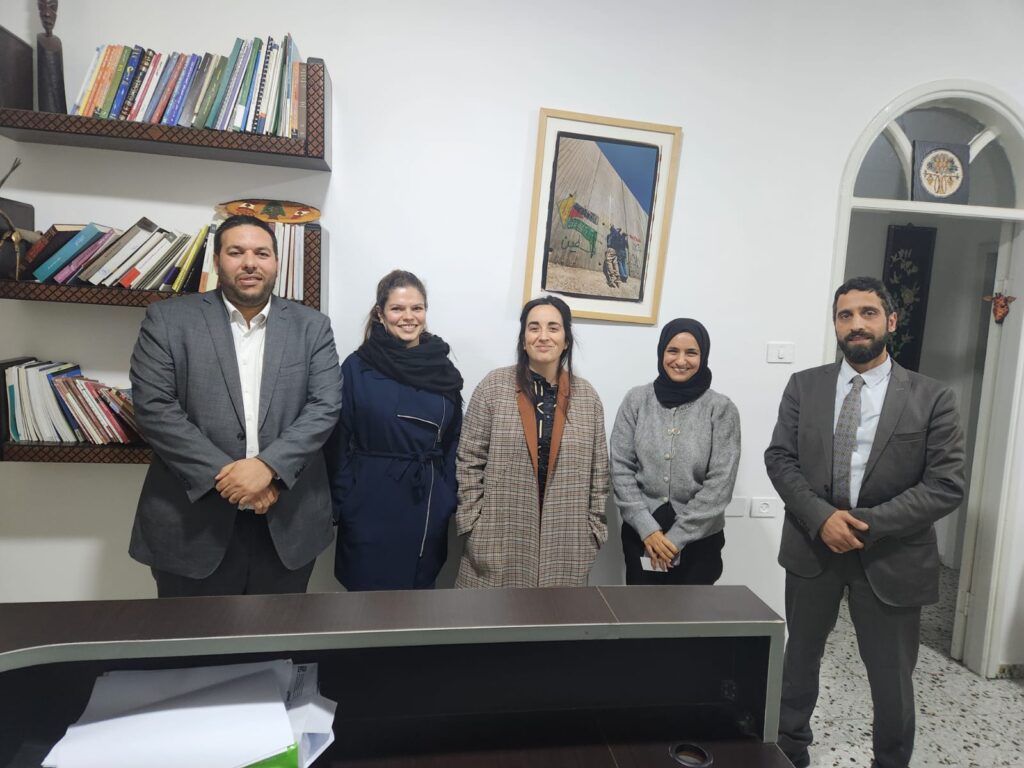Urgent Press Statement
Lawyers for Justice Group: Dozens of Detainees Commence Open-Ended Hunger Strike at Al-Junaid Detention Center, Nablus Lawyers for Justice Group is monitoring with grave concern reports received from families of detainees and recently released individuals regarding dozens of detainees at the Al-Junaid Detention Center in Nablus entering an open-ended hunger strike since the beginning of this week. This protest comes in response to reported dire detention conditions, including punitive measures, communication restrictions, medical negligence, and allegations of torture, humiliation, and ill-treatment. According to testimonies obtained by the Group, approximately (165) detainees are participating in the strike to protest their conditions of confinement and their prolonged detention without clear legal justification. This is particularly critical in cases where judicial release orders have been issued but remain unexecuted or ignored—some for extended periods. These practices bring back to the forefront the issues of “Administrative Detention” and detention at the pleasure of Governors or security chiefs. The testimonies further indicate that the detention center administration and security services have taken measures against the strikers, including: While Lawyers for Justice Group confirms that this data is based on reports from families and former detainees, it emphasizes the necessity of allowing competent authorities to conduct independent field verifications to assess the strikers’ demands and their health and legal status. Accordingly, Lawyers for Justice Group demands the following: The Group stresses that ensuring the humane treatment of detainees, respecting legal procedures—specifically the execution of release orders—and enabling oversight of prison administration (especially in Al-Junaid Prison) are legal obligations of the competent authorities, particularly the Ministry of Interior. Any breach of these obligations escalates risks to detainees’ health and undermines confidence in the justice system. The Group considers this statement an urgent and immediate appeal to address the demands, health conditions, and legal status of the hunger strikers. We call upon local and international civil society organizations, as well as the Ministry of Interior, to investigate allegations of torture, ill-treatment, and poor detention conditions, and to fulfill the strikers’ demands and improve their circumstances. Lawyers for Justice Group Issued on: February 18, 2026
Statement Issued by Lawyers for Justice
Regarding the Targeting of Samer Samara’s Family and the Killing of Children Ali and Rozan Samara from the Town of Tammun Lawyers for Justice is monitoring the killing of two children, Ali Samara (16) and Rozan Samara (4), from the town of Tammun. The deaths resulted from direct gunfire by members of a Palestinian security force targeting a civilian vehicle carrying women and children. This is according to the testimony of the detained citizen’s son during his father’s arrest and the statement issued by the Samara family. According to testimonies, a security unit in civilian clothing, traveling in civilian vehicles, opened fire without any prior warning or notice on a civilian vehicle carrying Mr. Samara and his family. This led to the death of the two children, varying injuries to other family members, and the arrest of the children’s father, Samer Samara, who is pursued by Israeli occupation forces and was also injured during the attack. The targeting of a civilian vehicle carrying women and children with lethal force constitutes a serious crime and a grave violation of the Right to Life. It cannot be justified under any security or political pretext. This crime occurs within an alarming context of gross violations committed by Palestinian security services in recent years, reaching a peak since the killing of political activist Nizar Banat. Human rights organizations and families have documented accusations from more than twenty families against the security services for involvement in the killing of their sons in similar incidents or as a result of torture. This indicates a dangerous pattern and methodology of using excessive and lethal force outside the framework of the law, amidst a total absence of effective accountability. Lawyers for Justice affirms that the Palestinian Authority, by acceding to international human rights treaties including the Convention against Torture and the International Covenant on Civil and Political Rights (ICCPR) is legally bound to regulate the conduct of its members, respect human rights, prohibit torture and ill-treatment, and ensure accountability to prevent impunity. The persistence of a culture of impunity for perpetrators of these violations undermines the rule of law, fosters a culture of revenge and harassment of dissidents and activists, and threatens civil and social peace. Demands of Lawyers for Justice: The Right to Life is an inviolable right that may not be infringed upon under any pretext. Tolerance toward these crimes paves the way for their recurrence, threatens civil peace, and undermines what remains of trust in the justice system. Serious accountability is the only way to prevent the repetition of these violations and protect society from the cycle of violence and impunity. Our deepest condolences to the Samara family and the families of the victims. Lawyers for Justice Monday, February 16, 2026
Statement by Lawyers for Justice Regarding the Summons of Syndicalist Activist Yousef Ajha
Lawyers for Justice expresses its deep concern over the ongoing harassment and targeting of syndicalist and human rights activist Yousef Ajha. This is evidenced by his summons to appear before a disciplinary investigation committee at the Ministry of Education in Bethlehem, due to his peaceful union activities in defense of teachers’ rights and his human rights work related to freedom of opinion and expression. Based on documentation conducted with Mr. Ajha, the Group confirms that the charges leveled against him by the disciplinary committee are unfounded and directly linked to his peaceful activism. These charges lack any genuine professional or legal basis and come as part of a series of prior punitive measures. Previously, Mr. Ajha was dismissed from his job due to his union activity before being reinstated by a Supreme Court ruling, which underscores the illegality of the actions taken against him. Lawyers for Justice considers the summons of Yousef Ajha a clear violation of the freedom of syndicalist work and freedom of expression. This action is part of a broader campaign targeting union activists and teachers’ representatives, coinciding with punitive measures taken by the Ministry of Education, the security services, and the Ministry of Finance. These measures have included the dismissal of teachers, suspension of salaries, summonses, and arrests, in addition to disciplinary transfers—all occurring while the Palestinian government continues to withhold teachers’ salaries under the pretext of the non-transfer of “clearance” tax funds by the Israeli occupation. The Group emphasizes that the Ministry of Education’s actions violate the State of Palestine’s obligations under international treaties, foremost among them the International Covenant on Civil and Political Rights (ICCPR). Furthermore, it constitutes a flagrant violation of the Palestinian Amended Basic Law, which guarantees freedom of opinion, expression, and union work, and prohibits arbitrary punishment. Demands of Lawyers for Justice: Immediate Cessation: An end to the summons and harassment of activist Yousef Ajha and a halt to all punitive measures against teachers for their peaceful union and protest activities. Urgent Intervention: An appeal to local and international human rights organizations to act swiftly to protect union activists and teachers and to end the gross violations of their fundamental rights. Lawyers for Justice reaffirms its commitment to following this case through legal and human rights channels. The Group will not hesitate to utilize all available legal tools to defend public freedoms and the rights of teachers and union activists. Lawyers for Justice February 10, 2026
Statement Issued by Lawyers for JusticeLaunching of the Report: “Social Movements in Palestine: The Experience of Civil Action and Legal Protection Frameworks”
Lawyers for Justice announces the launching of its new human rights report entitled:“Social Movements in Palestine: The Experience of Civil Action and Legal Protection Frameworks.”The report covers the period from 2015 to 2025 and examines the development of civil and labor movements in Palestine, as well as the legal and political challenges they have faced amid increasing repression and restrictions on freedoms. The report is structured around four main themes: Conclusion and Recommendations:The report presents clear recommendations to address the current reality of social movements in Palestine and to ensure their legal and constitutional protection by expanding public freedoms and holding accountable those responsible for violations of civil and political rights. Lawyers for Justice calls upon human rights institutions, civil society organizations, and official bodies to adopt the findings of the report, work to end all forms of repression against social movements, and guarantee citizens’ rights to freedom of expression and peaceful assembly, in accordance with the Palestinian Basic Law and the international conventions to which the State of Palestine has acceded. EndLawyers for Justice08 January 2026
Urgent Statement Issued by Lawyers for Justice Group Regarding the Arrest of Political Activist Mazid Saqf al-Hayt and the Extension of His Detention for 48 Hours for Investigation Purposes

Lawyers for Justice Group is closely monitoring with deep concern the arrest of political activist and human rights defender Mazid Saqf al-Hayt, who was detained by the Palestinian General Intelligence (P.G.I) in Nablus following a summons issued yesterday, Sunday. The group notes with particular concern that he is experiencing serious health conditions, as reported by his wife. He was referred today to the Public Prosecution, which commenced an investigation against him. He has been charged with criminal offenses including defamation against the authorities and incitement of sectarian strife, based on the Penal Code and the Cybercrime Law, in addition to a charge of possession of a weapon. All of these charges are politically motivated. According to his lawyer, Mazid has stated that most of the posts attributed to him are forged and do not belong to him. The group emphasizes that the timing of this political arrest raises serious suspicion, particularly as it occurred only days after Mazid Saqf al-Hayyat filed a constitutional appeal before the Supreme Constitutional Court against Presidential Decree No. (4) of 2025, regarding the formation of a committee to draft a temporary constitution for the transition from Authority to State. What has occurred represents a serious attempt to retaliate against an activist for exercising his right to peaceful constitutional litigation, constituting a flagrant violation of the International Covenant on Civil and Political Rights, which guarantees freedom of opinion and expression and the right to judicial recourse without fear or reprisal. The group asserts that resorting to the constitutional judiciary is a legitimate right and must not be turned into a pretext for political or security targeting. Accordingly, we demand: · The immediate release of activist Mazid Saqf al-Hayyat. · The cessation of all forms of retaliation against human rights defenders. · Ensuring a fair trial and the application of the Palestinian Basic Law and the International Covenant on Civil and Political Rights. Lawyers for Justice GroupRamallah – 22 December 2025
Urgent Statement Issued by Lawyers for Justice GroupRegarding the Arrest of Political Activist Mazid Saqf al-Hayyat and the Extension of His Detention for 48 Hours for Investigation Purposes.
Lawyers for Justice Group is closely monitoring with deep concern the arrest of political activist and human rights defender Mazid Saqf al-Hayyat, who was detained by the Palestinian General Intelligence (P.G.I) in Nablus following a summons issued yesterday, Sunday. The group notes with particular concern that he is experiencing serious health conditions, as reported by his wife. He was referred today to the Public Prosecution, which commenced an investigation against him. He has been charged with criminal offenses including defamation against the authorities and incitement of sectarian strife, based on the Penal Code and the Cybercrime Law, in addition to a charge of possession of a weapon. All of these charges are politically motivated. According to his lawyer, Mazid has stated that most of the posts attributed to him are forged and do not belong to him. The group emphasizes that the timing of this political arrest raises serious suspicion, particularly as it occurred only days after Mazid Saqf al-Hayyat filed a constitutional appeal before the Supreme Constitutional Court against Presidential Decree No. (4) of 2025, regarding the formation of a committee to draft a temporary constitution for the transition from Authority to State. What has occurred represents a serious attempt to retaliate against an activist for exercising his right to peaceful constitutional litigation, constituting a flagrant violation of the International Covenant on Civil and Political Rights, which guarantees freedom of opinion and expression and the right to judicial recourse without fear or reprisal. The group asserts that resorting to the constitutional judiciary is a legitimate right and must not be turned into a pretext for political or security targeting. Accordingly, we demand: · The immediate release of activist Mazid Saqf al-Hayyat. · The cessation of all forms of retaliation against human rights defenders. · Ensuring a fair trial and the application of the Palestinian Basic Law and the International Covenant on Civil and Political Rights. Lawyers for Justice GroupRamallah – 22 December 2025
Statement Issued by Lawyers for Justice Regarding the Constitutional Challenge to Presidential Decree No. (4) of 2025 on the Formation of a Committee to Draft a Temporary Constitution

Lawyers for Justice, in its capacity as legal counsel for activists Jamal Suleiman (Al-Saber) and Mazeed Saqf Al-Heit, has filed a constitutional challenge before the Supreme Constitutional Court in Ramallah against Presidential Decree No. (4) of 2025, issued by President Mahmoud Abbas, concerning the formation of a committee to draft a “temporary constitution” for the transition from authority to statehood. The constitutional appeal is grounded in well-established legal and national principles, which affirm that: Lawyers for Justice affirms that the constitution belongs to the Palestinian people as a whole and must not be appropriated or engineered unilaterally outside an inclusive, participatory democratic framework. Accordingly, we call for the suspension of the decree and the initiation of a comprehensive national dialogue to develop a unified vision grounded in popular representation and national legitimacy. Lawyers for JusticeRamallah – Palestine17 December 2025
Position Paper Issued by Lawyers for Justice Group Regarding the Violations and Arbitrary Measures Taken Against Striking Teachers in Palestine

Lawyers for Justice Group expresses deep concern regarding the punitive measures and escalating violations targeting teachers participating in the ongoing strike, which began on 13 October 2025, following the reduction of salaries to 50% since June 2025. This has placed thousands of teachers under severe financial hardship, compelling them to resort to strike action as a lawful and peaceful means to demand their legitimate financial and professional rights. The protest movement gradually escalated into a full strike after months of incomplete salary disbursement, alongside rising living costs that exceeded the actual income teachers received. As a result, many teachers lost their ability to sustain a decent standard of living and meet basic family commitments. Despite persistent appeals, the authorities have not meaningfully responded to teachers’ demands nor initiated a serious negotiation process. Instead, restrictive measures were adopted in an attempt to pressure teachers into ending the strike without addressing the root causes of the crisis. Based on data and testimonies collected through the electronic reporting form, Lawyers for Justice Group has monitored a wide range of violations targeting striking teachers—administrative, financial, security-related, and social. The most prominent recorded practices include: These practices reflect the transformation of administrative authority into a pressure and punitive tool, rather than a regulatory mechanism. Some of these violations rise to the level of serious interference with a constitutionally-protected right to strike, creating an unsafe environment for teachers. Lawyers for Justice Group stresses that the teachers’ strike is legal and legitimate, falling under the framework of Decree-Law No. (11) of 2017 regulating the right of public employees to strike, which explicitly permits strike action as a legitimate means of protest and rights-based demands. Therefore, classifying the strike as “unauthorized absenteeism” constitutes a misapplication of legal reference, and any punitive measures based on such classification are unlawful and subject to annulment. The teachers’ strike is protected under: Article (19) of the Palestinian Basic Law, which guarantees freedom of opinion and expression:“Freedom of opinion is guaranteed. Every person has the right to express their opinion and to publish it in speech, writing, or other means of expression or art, in accordance with the law.” Decree-Law No. 11 of 2017 regulating the right to strike in the civil service, which stands as the legal reference governing teachers’ strike cases. Any administrative or security measure aimed at pressuring, threatening, or retaliating against striking teachers constitutes a clear violation of constitutional rights and the law. Lawyers for Justice Group: ConclusionContinuing to address the teachers’ crisis through pressure and intimidation will not resolve the situation. Instead, it escalates tensions and undermines the rights of a sector that forms the backbone of the education system. Strike action is not disruption, but a legitimate outcry for rights—one that deserves respect, not punishment. Lawyers for Justice Group reaffirms its commitment to monitoring the situation legally and documenting all violations against teachers until their lawful demands are fully met.
Statement Issued by Lawyers for Justice on Conducting a meeting with Reporters Without Borders (RSF)

Lawyers for Justice held a productive meeting with the international organization Reporters Without Borders (RSF) to discuss the violations faced by journalists in Palestine in general, and in the West Bank in particular. The meeting addressed the experiences of male and female journalists and the challenges they encounter under the current conditions. It also explored avenues for joint cooperation and mechanisms to further develop the relationship between the organization and the group, with the primary aim of safeguarding journalists and providing all necessary means to protect and support them in carrying out their work. The two parties also discussed, in particular, the issue of arbitrary arrests targeting journalists, as well as repeated summonses, legal harassment, and prosecutions that constitute a clear violation of press freedom and the right to freedom of opinion and expression. Both sides emphasized the need to intensify legal and human rights efforts to confront these violations and ensure a safe environment that enables journalists to perform their duties without fear or restriction. Lawyers for Justice values this constructive cooperation with Reporters Without Borders and affirms its continued commitment to defending the rights of journalists, strengthening their legal protection, and working jointly to put an end to all forms of violations committed against them.
Statement Issued by “Lawyers for Justice”On the Continued Detention of Journalist and Activist Su’ad Al-Khawaaja Despite Four Judicial Release Orders

Lawyers for Justice is following with deep concern the continued detention of journalist and activist Su’ad Al-Khawaaja by the police in Ramallah, after she was summoned last Tuesday, despite the issuance of four separate judicial release orders and the payment of all required bail amounts. Her continued detention in defiance of these court decisions constitutes—based on our monitoring—a serious violation of personal liberty and a clear departure from the legal framework that guarantees rights and due process. The group views this ongoing detention without any legal basis as a troubling indication of an arbitrary misuse of authority, which necessitates immediate action by the Public Prosecutor to investigate the circumstances and reasons behind this detention, and to ensure that such practices— which violate Palestinian law and binding international standards—are not repeated. Accordingly, Lawyers for Justice issues an urgent call to the esteemed Public Prosecutor, as well as to local and international human rights organizations, to take swift action and exert pressure to uphold the rule of law and secure the immediate release of journalist Su’ad Al-Khawaaja. The group also stresses that the detained journalist is a mother of two children, a fact that exacerbates the humanitarian and social consequences of her continued detention. The group further reminds the authorities of their obligations under the International Covenant on Civil and Political Rights, particularly those related to the right to liberty and personal security, and the prohibition of arbitrary arrest or detention. End Lawyers for Justice17 November 2025
